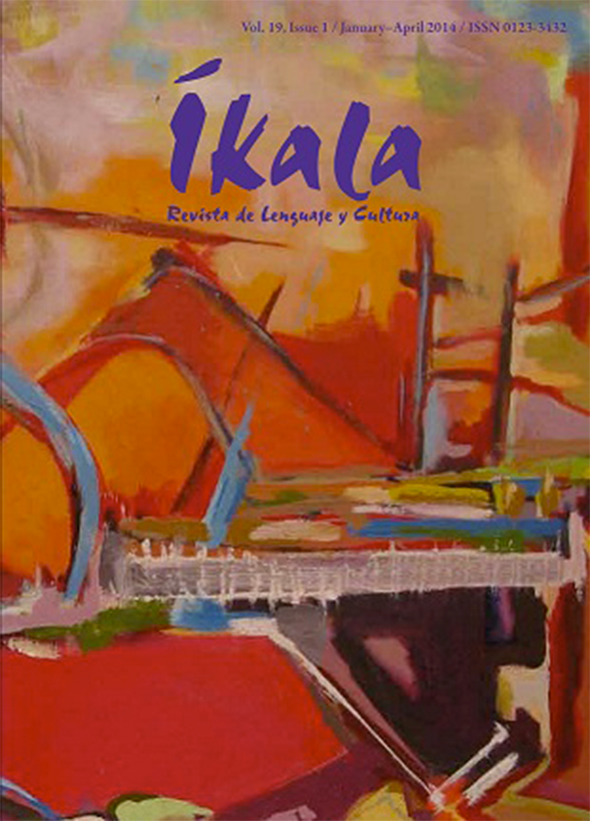Cultural Exchange Project between the University of Quindío and the University of Antioquia: Space of immersion in French as a Foreign Language
DOI:
https://doi.org/10.17533/udea.ikala.17853Keywords:
cultural exchange, immersion in foreign language, cultural competence, intercultural approach, project work pedagogy, cooperative learningAbstract
In this methodological article, we analyze the effects of an immersion activity on the cultural and communicative competence of a group of Colombian students from Universidad del Quindío and Universidad de Antioquia who learn French as a foreign language and who have an intermediate level of French. This academic and cultural exchange project is based on cooperative learning and project work. We carried out two guided tours in the department of Quindío and in the city of Medellin. Our results are based on the analysis we made of a questionnaire students answered, the evaluations they wrote about the project, the texts they produced and our reflections as teachers. The results demonstrate that learning becomes more meaningful in contexts where language favors both the access to linguistic and academic content and the creation of human, social and cultural links. This project strengthened the students' communicative and cultural competence but also their abilities for using technology and communication tools.
Downloads
References
Bérard, E. (1991). L'approche communicative: théories et pratiques. Paris : CLE International.
Blanchet, P. (2000). La linguistique de terrain, méthode et théorie. Une
approche ethno sociolinguistique. Presses universitaires de Rennes.
Byram, M. (coord.) (2003). La compétence interculturelle. Strasbourg: éditions du conseil el'Europe.
Calvet, L-J. (1993). La sociolinguistique. Que sais-je ? Paris, PUF.
CNA (2013). Autoevaluación con fines de acreditación de programas de pregrado. Guía de procedimiento No. 3. Ministerio de Educación Nacional.
Chambeu, F. (1997). Interculturel : perspective historique. Referencias/Ressources, No. 2.
Conseil de l'Europe (2001). Cadre européen commun de référence pour les langues. Apprendre, enseigner, évaluer. Strasbourg, Paris : Les Editions Didier.
Cuq, J-P (coord.). (2003). Dictionnaire de didactique du français. Paris : CLE Internationale.
Delors, J. (1996). La Educación encierra un tesoro. Informe a la Unesco, Comisión Internacional sobre la Educación para el siglo XXI. Publicaciones Unesco.
Gadet, F. (2003). La variation sociale en français. Paris: Ophrys.
Juillard, C. (1997). Réseau social, in M-L. Moreau (ed.). Sociolinguistique concepts de base. Liège: Mardaga
Labov, W. (1976). Sociolinguistique. Les Editions de Minuit, Paris.
Lebrun, M. (2007). Théories et Méthodes Pédagogiques pour enseigner et apprendre: Quelle place pour les TIC dans l'éducation. Belgique : De Boeck Université.
Lebrun, M. (2004). La formation des enseignants aux TIC : allier pédagogie et innovation. International Journal of Technologies in Higher
Education, 1 (1). Consulté en octobre 2013: http://hal.inria.fr/docs/00/02/78/30/PDF/ritpu0101_lebrun.pdf
Loaiza, N. et Arenas, M. (2011) Les échanges culturels comme espaces d'immersion en français langue étrangère : une expérience pédagogique à l'Université du Quindío et à l'Université Pédagogique et Technologique de Colombie. Lenguaje, 39 (1), 139-163.
Maga, H. (2005). La pédagogie de projet : Pourquoi ? Comment ? Consulté en mars 2009: http://langues.superforum.fr/t1281-la-pedagogie-de-projet-pourquoi-comment
Millán, M. (2004). Proyectándonos hacia el intercambio cultural de los Pueblos. Consulté en février 2010: http://argentina.indymedia.org/news/2004/08/216595.php
Milroy, L. (1987). Language and Social Networks. (2e éd.). Oxford : Blackwell.
Morel, S. (2006). La communication dans une classe d'immersion française aux USA. Consulté en février 2010 : http://afleur-rouen.over-log.com/pages/La_communication_dans_une_classe_dimmersion_francaise_aux_USA-1364419.html
Porcher, L. (2004). L'enseignement des langues étrangères. Paris : Hachette Éducation.
Puren, C. (2011). Modèle complexe de la compétence culturelle (composantes historiques trans-méta-, inter-, pluri-, co-culturelles): exemples de validation et d'application actuelles. Consulté en octobre 2013 : http://www.christianpuren.com/mes-travaux-liste-et-liens/2011j/
Downloads
Published
How to Cite
Issue
Section
License
Copyright (c) 2014 Íkala, Revista de Lenguaje y Cultura

This work is licensed under a Creative Commons Attribution-NonCommercial-ShareAlike 4.0 International License.












